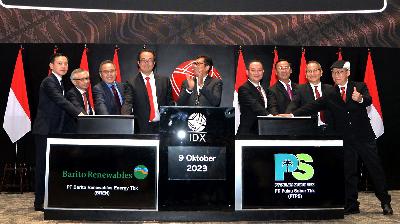Poor Management of the Stock Exchange
There are indications of problems with the IPO of Barito Renewables Energy. The stock exchange and capital markets authorities are neglecting their responsibilities.
Tempo
October 21, 2024

THE irregularities in the initial public offering of Barito Renewables Energy (BREN) show that there have been no improvements to the management of the Indonesian capital market. The Indonesia Stock Exchange (IDX) should be embarrassed by the fact that indications of manipulations of the company’s IPO were discovered by an overseas organization.
In October 2023, BREN, in which the majority shareholder is Barito Pacific—a company owned by tycoon with Prajogo Pangestu—officially listed on the IDX. The renewable energy company immediately became a significant presence. In only two months, the value of BREN shares increased tenfold from the initial offer price.
On December 8, 2023, the BREN share price soared to Rp8,100, and in May 2024 reached Rp12,000. But behind the dazzling performance of BREN on the trading floor, it subsequently came to light that the company had circumvented the IPO requirement concerning the number of free float shares the company was obliged to maintain.
Since 2021, the Indonesia Stock Exchange has had a rule that a minimum of 7.5 percent of the stock of any company wanting to trade shares on the exchange must be in the form of free float shares. And if the equity of a prospective share issuer exceeds Rp200 billion, the proportion of free float shares must be at least 10 percent. There is also a rule that the minimum number of shareholders is 300 parties.
The alleged transgressions came to light after FTSE Russell—an index of the London Stock Exchange—removed BREN from its index. FTSE Russell claimed that only four shareholders controlled 97 percent of the total shares issued by BREN. If this is true, BREN is also in violation of the principles of good governance—one of the requirements for a share issuer to be included in the FTSE Russell index.
Clearly this is not only the result of the reckless practices by BREN. The Indonesia Stock Exchange management must also be investigated because it allowed the listing of shares in a company that did not meet the requirements.
As well as the stock exchange authority, the Financial Services Authority (OJK) must share responsibility for the disarray over the BREN’s IPO, because it has full authority to refuse or allow a company to launch an initial public offering of shares.
The IDX, under close supervision of the OJK, should be a strict curator that is disciplined when it comes to selecting which company shares can be traded. Like a mall, the Indonesian Stock Exchange is the owner as well as the manager of a shopping center. The stock exchange authorities should be selective in order to prevent poor quality shares being traded, and to protect investors.
One reason why problematic companies are free to trade their shares is because the Indonesian Stock Exchange is solely oriented at pursuing growth and quantitative performance targets, such as increasing the number of companies launching IPOs. As a result, the stock exchange as a means of circulating capital and as a venue for public investment, has not implemented good governance.
It is no surprise that many people say our stock exchange resembles a casino.


